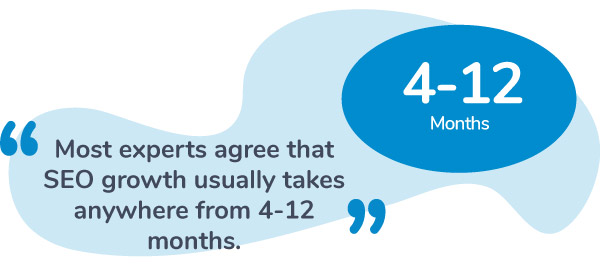How Long Does SEO Take To Deliver Results?
November 11, 2021 •DJ Team

Most experts agree that SEO growth usually takes anywhere from 4 to 12 months. However, trying to predict how long SEO takes to work within that range is a lot like trying to predict the weather.
There are systems that help us forecast what’s coming next, and sometimes even confident people in suits telling you what will happen. But, we’ve all grumbled as the rain comes down in the end, even though the weatherman promised us sunshine.
And that is kind of like predicting how long SEO takes to work. We have tools and strategies, but at the end of the day, the prediction is, is at most, an educated guess.

Let’s explore how you can start making those guesses for yourself with the support of SEO keyword research technology.
How Long Does SEO Take to Work in 2021?
Even though the marketing world’s understanding of SEO has changed for the better, it still takes an average from 4 to 12 months to start seeing consistent growth in web ranking. In the beginning of SEO, websites focused on identifying 5-10 keywords to help bring in traffic.
So what’s changed from then to now? Well, a better understanding of how people search has changed. People’s searches have become conversational, in part because more and more people are using Siri and voice to text.
SEO experts should not only be identifying short-tail keywords but also longer phrases and questions focused on the syntax and diction people use in speech.
Why Does SEO Take So Long to Work?
You can narrow down the answer to this question by focusing on three key variables: competition, inbound links, and content.
If you are in a niche market like, say, dinosaur repellant, then your competition will be quite low, and therefore not a lot of competition exists, shortening the time it takes to get your SEO up and running.
However, in the real world, where competition does exist and dinosaurs do not, having effective SEO takes more skill and nuance.
Overtaking the lower-ranked sites won’t take too much time at all, but after the initial ascent, each level becomes more and more difficult to pass, because the top sites are also focusing on the same keywords and phrases.
The general thought is that the more inbound links you create from other sources to your website, the easier it will be to improve SEO. This is true in the short term, but eventually, those links will lose their impact. Rather, creating focused, well-placed, and fewer links will greatly improve your SEO in the long term.
Another positive to a more surgical SEO approach is that the higher quality your inbound links are, the more difficult it will be for your competition to replicate them.
Founding editor of the SEM Post, Jennifer Slegg put it this way, “As long as you are delivering what your title is promising if that ends up being 100 words (ie. How to Hard Boil an Egg), that’s fine.” Quality takes many forms so be sure to deliver what you promise, make it awesome, and the rest will follow.
How Long Does it Take For a New Website to Get Traffic?
Most new websites will start to receive organic search traffic within a few days or weeks after launching. But the metric for success varies from site to site, so identifying the kind of growth needed for your company will help cut away any unnecessary metrics you may be using.
How to get traffic on a new website:
The goal is to increase visits from month to month. Being mindful of relevant keywords and content, having an easy-to-navigate mobile web interface, and quick loading times are just some of the variables developers control to help start their site off on the right foot.
Release content on a schedule so Google bots will “crawl” the site more regularly. Consistent publishing also promotes a more regular flow of visits which sends positive user experience feedback to Google.
How Do I Know if My Keywords are Working?
Knowing where your optimized pages are ranked in the search results is the most straightforward way to know whether or not your SEO keywords are working.
Fluctuations in the first three months are positive signs that your SEO is taking effect. Using a rank tracker can help keep an eye on your keyword search rankings.
Site traffic is another way to see whether or not your SEO is gaining traction. Keeping a close eye on traffic after you’ve implemented your SEO will further help you retool and adapt your SEO strategy for success.

Optimize Your SEO Strategy with DemandJump
Understanding the time and key strategies necessary to properly implement SEO can help your business continue to grow and stand out. However, it takes time and thoughtful planning to make sure your SEO is utilizing proven strategies to increase your site’s search ranking.
You also need to know how to measure that growth and to retool when necessary. That’s where DemandJump comes in. DemandJump helps new and established websites alike start climbing the search rankings in a matter of weeks, not months.
The real-time dashboards help you identify where you’ve had the biggest keyword gains, and what phrases to target next to keep the momentum going strong.
Don’t wait, start writing content that ranks fast - today!
Featured Articles
Categories
- Attribution Tracking (13)
- Channel Optimization (11)
- Consumer Insights (68)
- Content Marketing (251)
- Data Science (8)
- Digital Marketing (6)
- Digital Transformation (26)
- Enterprise (10)
- Lead Generation (14)
- Market Intelligence (8)
- Marketing Analytics (39)
- Marketing Attribution (57)
- Marketing Management (153)
- Marketing Operations (86)
- Organic Search (222)
- Paid Search (52)
- Pillar-Based Marketing (63)
- Programmatic Advertising (9)
- SaaS Content (14)
- SaaS Marketing (29)
- Search Marketing (111)
- SEO Keyword Research (28)
- SEO Pillar (18)
- SEO Strategy (46)
- SMB (5)
- Website Content (12)


